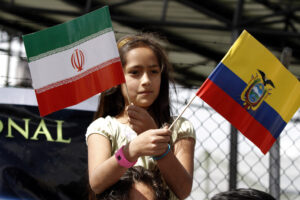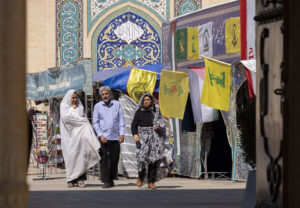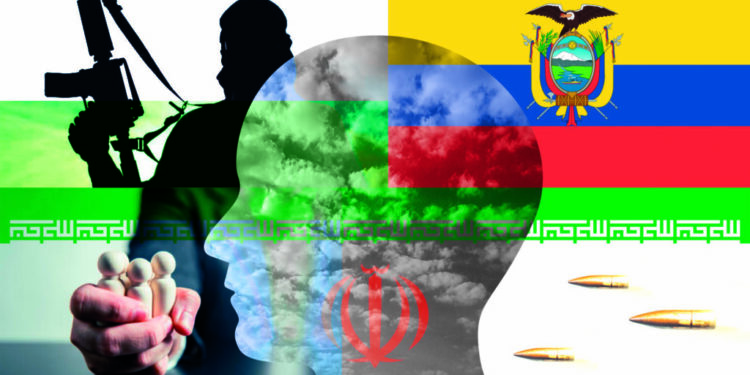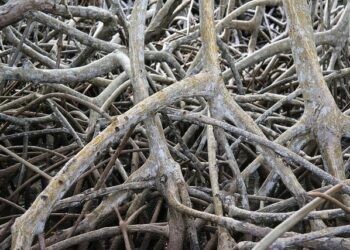In recent years, IranŌĆÖs strategy of penetration has changed in Ecuador. Following the strengthening of government relations during the presidency of Rafael Correa (2007-2017) and the closure of the Ecuadorian Embassy in Tehran in 2020, the regime of the ayatollahs has adopted a more discreet profile in the Latin American country. Its agenda is now invested in a more local, cultural penetration, taking advantage of social activities to gain support on the ground. In May, for example, Iran inaugurated a medical center run by the Iranian Red Crescent in Chillogallo, south of the capital Quito.
ŌĆ£Iran believes that its presence in Ecuador, as in the rest of Latin America, gives it a greater strategic capacity, in the sense that it can influence certain governments, regardless of whether the current one, for example, is not favorable to it. Tehran also tries to influence the population and convert people into followers of Iran and its values. ThatŌĆÖs why there are places that look like centers for social gatherings but are actually centers of indoctrination,ŌĆØ Alberto Priego Moreno, professor of international relations at SpainŌĆÖs Comillas Pontifical University, told Di├Īlogo.
Even in Ecuador, IranŌĆÖs main objective continues to be the export of its Islamic revolution. In his report, The Influence of Iran (and Hezbollah) in Latin America, published by the Spanish Institute for Strategic Studies, Priego highlights how the revolutionary character of the ayatollahsŌĆÖ regime makes of Iran an anti-Western proselytizing state.
Universities and cultural centers
View of the city of Qom, Iran, June 19, 2024. The ancient city is home to the Oriental Thought Cultural Institute, led by Mohsen Rabbani, who has an Interpol Red Notice and has long been considered the main architect of the AMIA bombing in Buenos Aires. (Photo: Alireza/Middle East Images via AFP)
The main instrument of Iranian influence in Ecuador is Al-Mustafa University, which was sanctioned in 2020 by the United States and later by Canada, for hosting and training Pakistani and Afghan Shiite militias in Syria in support of the regime of Bashar al-Assad. According to the U.S. Treasury, Al-Mustafa University ŌĆ£serves as an international recruiting network for IranŌĆÖs Islamic Revolutionary Guard Quds Forces,ŌĆØ which directs IranŌĆÖs terrorist operations abroad.
Behind Al-Mustafa is Mohsen Rabbani, who has an Interpol Red Notice and is accused of masterminding the bombings of the Israeli Embassy in 1992 and the Argentine-Israelite Mutual Association (AMIA) in 1994 in Buenos Aires, Argentina, in which 113 people died and hundreds were injured. As a representative for Latin America, who reports directly to the Supreme Leader of Iran Ali Khamenei, Rabbani directs from the city of Qom the Oriental Thought Cultural Institute, whose mission is the dissemination of religious books in Portuguese and Spanish and the strengthening of ties between Iran and the region. The institute is associated with the Al-Mustafa International University and Masuma TV, which broadcasts RabbaniŌĆÖs videos in Spanish.
RabbaniŌĆÖs son-in-law Hojatoleslam Mohsen Mohsen Mojtahedzadeh, known as Sheikh Ali Qomi, lived in Quito, where he indoctrinated the local population on the ground and through his social networks.
According to his May 2017 testimony before the U.S. Congress, Emanuele Ottolenghi, an expert on Iran and Hezbollah at the research institute Foundation for Defense of Democracies, ŌĆ£Qomi is the educational leader of the Oriental Thought Cultural Institute. He is probably the most ubiquitous face of the Iranian missionary network in Latin America.ŌĆØ RabbaniŌĆÖs son-in-law is also the author of a voluminous history of Christianity in Latin America, in which he analyzes the spread of Christianity in the region. ŌĆ£The text, which is describes as a guide for Shiite missionaries in Latin America, seems to suggest that Islam, like Christianity, could conquer the region and supplant the dominant religion in less than a century,ŌĆØ said Ottolenghi.
Also active in Ecuador, as part of Al-MustafaŌĆÖs propaganda, is the Fanus Foundation, a publishing house run by the Iranian regime that publishes religious texts in Spanish and works about Qasem Soleimani, who commanded IranŌĆÖs Quds Force from 1998 until his 2020 death. The Quds Force is a military intelligence division of the Islamic Revolutionary Guard Corps, designated a terrorist group ŌĆ£for providing material support to the Taliban and other terrorist organizations.ŌĆØ
 File photo. A girl holds an Ecuadorian and an Iranian national flag to receive Iranian President Mahmoud Ahmadinejad upon his arrival to Mariscal Sucre Airport in Quito, Ecuador, on January 12, 2012. IranŌĆÖs penetration strategy in Ecuador has evolved to focus more on the cultural aspect. (Photo: Pablo Cozzaglio/AFP)
File photo. A girl holds an Ecuadorian and an Iranian national flag to receive Iranian President Mahmoud Ahmadinejad upon his arrival to Mariscal Sucre Airport in Quito, Ecuador, on January 12, 2012. IranŌĆÖs penetration strategy in Ecuador has evolved to focus more on the cultural aspect. (Photo: Pablo Cozzaglio/AFP)
In Ecuador, Al-MustafaŌĆÖs courses are offered and publicized through the Ecuadorian Iranian Cultural Center for Cooperation, based in Quito. That center has organized several Quds Day in Ecuador in cooperation with the Central University of Ecuador in Quito. Quds Day, or Jerusalem Day, is celebrated on the last Friday of Ramadan, and is an annual pro-Palestinian event organized by the Iranian government against Israel. According to a report by non-profit United Against Nuclear Iran (UANI), titled, IranŌĆÖs Anti-Israel Ideology: Quds Day, ŌĆ£although nominally about Jerusalem, Quds Day serves as a forum for Iranian regime figures to call for hostility against Israel and demand its elimination. ŌĆśDeath to IsraelŌĆÖ is a common refrain at the rallies, often accompanied by ŌĆśdeath to the United States.ŌĆÖŌĆØ
In addition to Al-Mustafa, the Salam Institute also operates in Ecuador, under the University of Religions of Qom, which trains Latin American Shiite Muslims as teachers and theologians to fulfill this function once they return to their countries of origin.
According to Priego ŌĆ£structures such as the Salam Institute seek to influence educational centers, both university and basic general education, thus building the future generation of citizens close to Iran in Latin America. This complex network of resources, deployed miles away from Iran, serves to enable the Persian country to achieve its foreign policy goals in a territory such as Latin America, where conditions of inequality, poverty, and disenchantment become ideas.ŌĆØ
Espionage
There is a second level of Iranian penetration in Ecuador, which is carried out through embassies and spies. ŌĆ£All states use cultural centers to promote their values, interests, and foreign policy. In the case of Iran, being a non-democratic regime, it espouses values that are not compatible with those of the states it is in. For this reason, it also indoctrinates through embassies and uses unsuspected places to mask the presence of its intelligence agents,ŌĆØ Priego told Di├Īlogo.
In 2020, a young Iranian couple, originally from the city of Ahvaz, capital of Khuzestan province in western Iran, was detained at QuitoŌĆÖs international airport when they attempted to enter the country carrying false Israeli passports. According to the Ecuadorian government, they intended to travel to Madrid. A similar case had occurred in Argentina in March 2019.
ŌĆ£Iranian diplomatic delegations usually have a department belonging to the Ministry of Intelligence and Security (VEVAK28) and another to the Revolutionary Guards. In fact, many of the diplomats who are usually accredited abroad are also members of the Revolutionary Guards, something that in Latin America has been a constant reality,ŌĆØ Priego added.
Hezbollah
 Two Iranian women and a man walk past Hezbollah flags in a holy shrine in Shiraz, Iran, on October 8, 2024. According to Israeli political scientist Ely Karmon there is evidence linking Hezbollah to the emergence of Islamic mosques in Ecuador. (Photo: Morteza Nikoubazl/NurPhoto via AFP)
Two Iranian women and a man walk past Hezbollah flags in a holy shrine in Shiraz, Iran, on October 8, 2024. According to Israeli political scientist Ely Karmon there is evidence linking Hezbollah to the emergence of Islamic mosques in Ecuador. (Photo: Morteza Nikoubazl/NurPhoto via AFP)
In his analysis, Iran and Its Proxy Hezbollah: Strategic Penetration in Latin America, Israeli political scientist Ely Karmon notes that ŌĆ£evidence linking Hezbollah to the emergence of Islamic mosques in Ecuador, which promote radical religious views consistent with HezbollahŌĆÖs ideology, indicates that the organization recognizes the need to increase its ideological support base in the Latin American country.ŌĆØ
Although Ecuador is not home to a large Lebanese Islamic community, over the years, authorities have noted the presence of Hezbollah. Rather than being partly funded by donations from the local diaspora, as is the case in other Latin American countries, the Lebanese terrorist organization is mostly supported by drug trafficking in Ecuador.
As Karmon reports, in June 2005 Ecuadorian police broke up an international cocaine trafficking network run by a Lebanese restaurant owner, Rady Zaiter, suspected of raising funds for Hezbollah. Investigations led to the arrest of 19 people in Brazil and the United States. In 2001, Syrian-Lebanese Mohammed Ali Farhad was arrested in Colombia. He was accused of having links to Hezbollah and of running money laundering and cigarette trafficking operations between Colombia and Ecuador.
ŌĆ£Hezbollah is IranŌĆÖs tool to defend its worldview and achieve its foreign policy goals. It doesnŌĆÖt matter if itŌĆÖs in Lebanon, Yemen, Palestine, or Ecuador. It is also linked to arms and drug trafficking,ŌĆØ says Priego. According to the expert, ŌĆ£there are areas in Latin America that are clearly of interest to both Iran and the criminal groups it supports, because drugs are produced in Latin America. What does Iran do with that money? It uses it, for example, to transfer weapons to the Houthis or to Iraqi militias.ŌĆØ
The penetration of Iran and Hezbollah in Ecuador not only threatens the security of Latin America but is a hydra with tentacles and global consequences, the expert concludes.
Source link : http://www.bing.com/news/apiclick.aspx?ref=FexRss&aid=&tid=675e0844a9104ebea23e5cdc25f02604&url=https%3A%2F%2Fdialogo-americas.com%2Farticles%2Firans-influence-in-ecuador%2F&c=12434336559287551697&mkt=en-us
Author :
Publish date : 2024-12-01 22:00:00
Copyright for syndicated content belongs to the linked Source.










